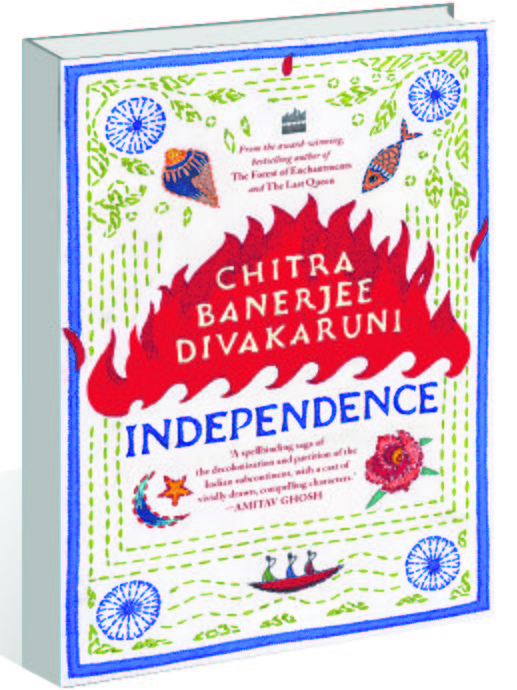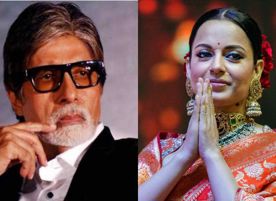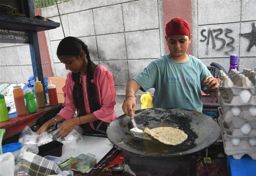Independence by Chitra Banerjee Divakaruni. HarperCollins. Pages 350. Rs 699
Book Title: Independence
Author: Chitra Banerjee Divakaruni
Sarika Sharma
The year gone by, somehow, hasn’t been about the celebration of freedom. It seemed more about Partition, the senseless bloodbath that engulfed humanity 75 autumns ago and those who got crushed in it. Perhaps because the generation that saw it first-hand is moving on. They are sharing their tragic stories in utmost urgency, for, in another few years, they will remain mere stories, their existence confined to books and oral history. Chitra Banerjee Divakaruni’s ‘Independence’ is about the Gangulys of Ranipur torn in the melee of freedom, Partition and Independence. The strange unfortunate women of the Ganguly family.
Priya, Jamini and Deepa are all special to their father in their own way. Nabakumar was the true son of the soil, a doctor, a freedom fighter. Chitra asks: When men go off to be heroes, do they even realise what it does to the women they leave behind? Nabakumar was a father and a husband too.
As Calcutta burns in communal fire on Jinnah’s Direct Action Day — also known as the 1946 Calcutta Killings — Nabakumar finds the call of duty beckoning him to his little clinic where the number of injured is increasing. He rushes out to the street to bring in a dying patient, only to be hit by a bullet. The quiet lives of Ganguly women are about to change.
Deepa, the beautiful Deepa, has fallen in love with Raza, son of Nabakumar’s Muslim colleague. Jamini and Priya are in love with the same guy, Amit, son of Nabakumar’s best friend, Somnath Chowdhury. How could life have been smooth at all?
Deepa will have to move on alone in this journey henceforth — first faking to be a Muslim and then faking a wedding with Raza. It isn’t Partition yet, but she has to move to Dacca, for Raza is a prominent Muslim League activist. She feels a churning inside, a pain as though she is being torn into two. Priya wants to be a doctor, just like her father. When the college in India rejects the “woman” candidate, she decides to go to America. Amit feels cheated. He tells her to forget him. For Jamini, it is an opportunity to win him over but Amit can’t be won. What place is there for her then, Jamini wonders, a girl with a limp and her head filled with romantic folly, in this new India?
Amid all the exhilaration — the framing of the Constitution, voting rights for all — people of the country were battling their own troubles. Miniscule perhaps, but to the Ganguly women, these seemed to overshadow even the greatest national triumphs.
As Partition’s fury reaches Ranipur, Jamini and her mother Bina are caught in it. Amit comes just in time to save them but who will marry Jamini, whose honour stands questioned because of an attempted rape? Amit, it turns out to be. Priya has to return one last time and meet Amit before he forces himself into an alliance he would have never wanted. But the roulette spins once again. Raza is dead, and Deepa has to be rescued. The sisters will go to East Bengal with Amit. Not all of them will return.
Chitra is a master of words. Her last book, ‘The Last Queen’, brought a wider audience’s attention to the amazing life of Rani Jindan. The prose in ‘Independence’ is peppered with historical events, woven so finely you almost see Nabakumar walking with Sarojini Naidu at the Salt March. Priya’s meeting with Naidu is what decides the course of future for not just her but aspiring women doctors in the newly Independent country. Music is often the refuge and the pillar of strength for the sisters. Most readers would be familiar with Rabindra Sangeet but Nazrul Geeti was more popular in what is now Bangladesh. Chitra brings in both.
In a year that saw Partition novel ‘Tomb of Sand’ become the first book in Hindi to win the International Booker Prize, Chitra Divakaruni’s story of sisterhood and nationhood, despite all odds, is certainly the novel to end your year with.














